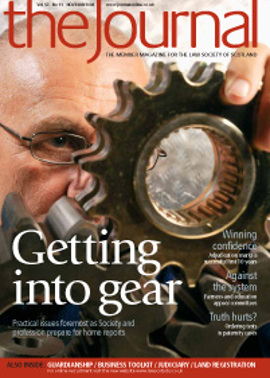Prevention or cure?

Where is the backup?
A solicitor who was the subject of a recent Discipline Tribunal report has written to suggest that it raises issues of interest to the profession as a whole, regarding what should be available to those in genuine need of help
The Society does not currently provide sufficient protection or support and has over a number of years allowed government interference to compromise the interest of its members. Morale within the profession is at an all time low, particularly amongst those practitioners relying on legal aid and domestic conveyancing.
A main area of concern relates to the framework surrounding compliance and enforcement policing of the Solicitors Accounts Rules. In recent years these have become increasingly demanding, placing further pressure on those engaged in the practice of conveyancing as practices are forced to rely on ever increasing volumes of transactions to raise sufficient revenue.
Accounts Rules compliance is extremely labour intensive. If the requirements of the rules are not accurately maintained on a daily basis, records can very quickly fall into disarray. The Journal’s Discipline Tribunal reports often contain smug phrases such as “solicitors should be aware that”, “practitioners should ensure”, etc. The Society should be aware that in cases involving key resignations of personnel within small to medium sized practices specialising in residential conveyancing, chaos can often ensue within a short period, if efficient cashroom replacements cannot be found quickly. It is a major shortcoming in the Society’s structure that no internal facility exists to support honest solicitors in such circumstances – which are becoming increasingly prevalent as the rules continue to exert greater demands.
My own firm was the victim of intense commercial poaching. With three key resignations, I found myself in a situation where I simply could not replace competent staff, and indeed in the cash department itself I went through five different cashiers (one formerly of the Society’s inspection team!) who were unable to resolve the difficulties.
The Society’s accountants who inspected the firm’s records proceeded with tenacity and efficiency, as was their brief. No support was offered, despite my suggestion that it might be appropriate to offer assistance in cases where honest solicitors found themselves in genuine difficulty. I accept the duty to keep good records, but competent personnel cannot be pulled out of a hat at short notice. Ultimately I advised the Society that I conceded defeat and requested additional time to run the practice down to closure, a gargantuan effort that left all involved in a state of professional exhaustion.
It is entirely wrong that in cases involving genuine disorder, the Society should use “seek and destroy” tactics against its own members, whose contributions pay for the talents of those seeking to provide detailed reports as to the shortcomings of solicitors’ firms in genuine difficulty. I agree that said tactics should be utilised in cases of dishonesty, but in other instances there should be a facility offering some form of assistance which would also generate funds for the Society.
When I appealed to the then chief accountant for assistance, I was given the clear impression that he was not unsympathetic with my request, but his hands were tied by the Society’s own clear brief that such assistance would be inappropriate.
There is tremendous resentment within the profession relating to this unfortunate state of affairs, with a great many lawyers feeling that the current structure does not provide backup which the Society’s own members in genuine compliance difficulty deserve.
M G Sykes,GlasgowWhy heads are buried
The wife of another solicitor who was suspended from practice four years ago has written in response to the article on the Society’s Interventions Department (Journal, February 2008, 28)
After commenting on the difficulties facing sole practitioners due to a combination of the amounts levied in bank charges and the low level of conveyancing fees, she continues:
In addition is the sheer impossible situation of having to operate as a solicitor, office manager and accountant, due to unaffordable accountancy fees, with the bare minimum of staff, with virtually no holidays or time off for illness.
On top of this is the Society, with the conflicting roles of policing and at the same time supposedly being the representative body of the profession.
Ms Grandison [the Society’s Director of Interventions] is quoted as saying that solicitors who are struggling should not “bury their heads”. Solicitors who find themselves in an impossible position for the above reasons do indeed bury their heads, feeling there is no real support via their professional body.
I would argue that if the Society did offer real support to sole practitioners and other firms who find themselves in difficulty, rather than the “tick box” system they offer to salve their own consciences, many of those who find themselves in my husband’s position would be able to save their businesses, reputations and careers, as well as safeguarding the jobs of their staff and their own mental and physical health.
My husband struggled for a period of 12 years after the breakup of a business partnership. Everything that could go wrong in our lives went wrong, including four office break-ins, family bereavements and personal health issues, as well as the financial stresses of trying to run a small practice and safeguard his longserving staff’s jobs.
Ms Grandison says it may be better to “shut up shop”, but what she does not appear to take into consideration is people’s pride, reputation and careers built up over many years, as well as the devastating effects that these actions have on the solicitor’s family and employees.
Looking through cases in the Scottish Solicitors’ Discipline Tribunal reports over the past year or two, I note how many relate to those operating as sole practitioners, struggling to manage accounting systems on top of their work as a solicitor, and the now massive red tape surrounding legal procedures. I also note that solicitors generally fail to respond to the Society’s investigative procedures.
I would argue that the reason for this is that those finding themselves in this position are often suffering at the very least from stress if not depression, brought on as a result of their business problems and sometimes personal and family difficulties.
The investigative procedure involves bombarding those who are already suffering from these health issues with huge amounts of correspondence, and the further feelings of hopelessness and helplessness this generates in the face of any response that they may give.
The reality is that if the Society put proper systems in place to support struggling businesses, such as something as basic as free or inexpensive accountancy/bookkeeping help, it could make the difference between staying in business and going bankrupt. If those who were struggling financially and with health issues felt they could depend on their professional body for real support, they would no doubt come forward before things got out of hand.
It would be interesting to find out how many other sole practitioners and struggling small businesses have had the same experience and subsequent devastating effect on their families as has been the case for my husband and our family.
[Name and address supplied]
Comment from the Society
Rather than respond to the detail of individual circumstances and cases, it might be helpful to respond to some of the main points made.
Section 1 of the Solicitors (Scotland) Act 1980 requires the Society to act as a members’ organisation as well as a regulator which must balance the public interest with that of the profession. The Society always tries to offer practical advice and support to its members, and the number of calls and range of advice given to practitioners shows that many members use and benefit from the advice and support given on accounts and practice rules. In some instances the regulatory role of the Society, and more particularly its financial compliance inspectors, places limits on the type and amount of support which can be provided, and at times the Society must make the difficult decision to intervene in practices in the overall interests of the profession and the public.
In addition to the focus on improving regulation, the Society works closely with the Society of Law Accountants in Scotland who train many of the cashroom staff in firms. Where solicitors have complaints made against them, the Society always recommends that they contact either their local Council member or a representative of the Legal Defence Union. The Society also promotes LawCare, which offers advice and support for members, their staff and their immediate family.
Due to the Society’s role as regulator, it would be a conflict if it were also to provide direct accountancy services, which is why practitioners are always advised to seek external accountancy services.
In recent months the Society has increased its focus on practice advice in response to the current economic conditions and the acute impact on certain sectors of the legal profession. Elsewhere in the Journal (p 40) you will find an article on “the business toolkit”, which has a range of advice for firms and practitioners. On 29 November the Society is holding a conference for high street practitioners which will address issues around the impact of the downturn in the economy. Elsewhere the Update department is running several other conferences and CPD courses aimed at providing practitioners with useful and relevant information to assist them to meet the challenges they are facing.
The Society continues to make improvements to the way it works, and comments are always welcome. No one underestimates the complexities of running a legal firm or the obligations placed on the owners of the firm. It is challenging and as well as legal skills, solicitors must demonstrate sound business skills. In both regards, the Society will continue to offer assistance to its members.
In this issue
- Support where it's needed
- Prevention or cure?
- Gearing up for change
- A time for support
- Foreign companies and the Registers
- Sensitive relations
- New course for the courts
- Adjudication – 10 years on
- Jack's story
- Professional Practice Committee
- Sourcing our future
- Data security begins at home
- Going equipped
- Bonus round
- Nothing But Delivery
- Checking out checklists
- The final word
- Redundancy: an age old issue?
- Cohabitation update
- Inventive judging?
- Scottish Solicitors' Discipline Tribunal
- Website review
- Book reviews
- Beating the credit crunch
- Keeping a clean sheet
- Battening down in buy-to-let






